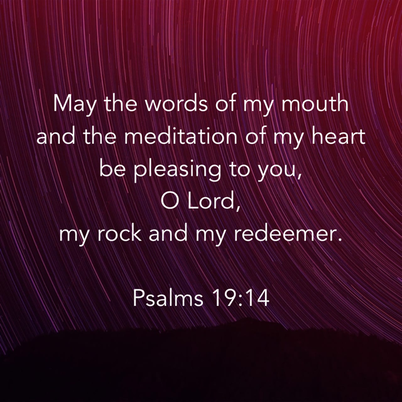|
Good morning!
We're so glad that you've decided to join us for Sunday School!
When we meet together in person, we share our joys and concerns with each other before we focus on our Sunday school lesson. Think about your needs and concerns right now, and if you like, you can share them in the comments.
Today’s lesson is about Jeremiah, who spoke the word of God faithfully, even though others did not want to hear it and despite the physical suffering and danger it caused him. Think of situations where perhaps God is showing you a need for change or repentance. Then ask God to give you the strength and courage to obey and to make those changes. The prayer below may serve to guide us in our opening prayer. It is from the Vanderbilt University lectionary website.
God of power and justice, like Jeremiah you weep over those who wander from you,
turn aside to other gods, and enter into chaos and destruction. By your tears and through your mercy, teach us your ways and write them on our hearts so that we may follow faithfully the path you show us. Amen.
Today's lesson is on Jeremiah 38:14-23.
Introduction Katsuhiko Ishibashi, a seismologist and university professor in Japan, for years warned that many of Japan’s nuclear power plants were at risk for significant damage from earthquakes. Though he and his colleagues warned about possible catastrophe, they were largely ignored. When a magnitude 9.0 earthquake occurred off the northeastern coast of Japan’s main island in March 2011, the resulting tsunami caused massive damage to the nuclear power station in Fukushima. The ensuing radioactive fallout forced some 160,000 people to evacuate their homes across an area of approximately 300 square miles. Studies and reports since published vindicate Ishibashi’s warnings about possible disaster at the site. When the nation of Judah faced God’s wrath for their many violations of the covenant with God, the Lord commissioned Jeremiah to sound the warnings and call them to repentance. Perhaps it was not too late for this faltering nation and their king to avert the disaster and desolation that awaited them. Lesson context The prophet Jeremiah delivered God’s message to the nation of Judah from 627 until the mid-580s B.C. Five kings reigned over Judah during Jeremiah’s ministry. Josiah, the first o these five, was righteous (2 Kings 23:25). The four following him, however, were all wicked. These included Johoiachin, who was removed from the throne and taken into captivity when the Babylonians invaded in 597 BC (24:12). King Nebuchadnezzar of Babylon replaced Jehoiachin with that man’s uncle, Mattaniah, renaming him Zedekiah in the process (24:17). Zedekiah wavered between service to the Babylonian king and rebellion again that overlord. He ruled during Judah’s final decade as a nation before it fell in 586 BC. Like the northern kingdom of Israel before it, Judah’s unfaithfulness to the covenant had exhausted the Lord’s great patience. Jeremiah proclaimed that the Lord would use the Babylonians as instruments of judgment against Judah (Jeremiah 20:4-6). Throughout his prophetic ministry, Jeremiah warned Jerusalem in word and in deed of the coming destruction. Yet rarely did anyone take him seriously. His oracles were misunderstood and dismissed as the rhetoric of a traitorous, pro-Babylonian sympathizer. Meanwhile, Jeresalem’s more “loyal” prophets proclaimed peace, safety and deliverance. The people believed their fabricated, uninspired message. Twice in Judah’s final months, while Jerusalem was under siege, Jeremiah endured punishments for his message of doom. He was held in a dungeon for many days before Zedekiah summoned him and released him into the courtyard of the guard. There he continued to reveal the unpleasant things God told him. Zedekiah’s officials deemed his message treasonous and demoralizing and had him put into a muddy cistern. But a high official named Ebed-Melek gathered 30 men to lift him out of the mud and rescue him from certain death. I. A Secret Meeting (verses 14 to 16) When the Babylonians returned and besieged Jerusalem and defeat seemed near, Zedekiah began summoning Jeremiah for conversations, probably going through a back door from the palace to the temple. The king probably wanted to meet away from the suspicious eyes and ears of his officials. The king had summoned Jeremiah previously. Zedekiah’s repeated summoning shows at least a partial respect for Jeremiah’s advice, although it seems he was still unsure about whether Jeremiah was telling him the whole truth. God had repeatedly assured Jeremiah of divine protection, even from kings and officials, but being human he feared for his life. He understood that speaking harshly against the king could cost him his life. Possibly Zedekiah was hoping Jeremiah would adjust his message and offer a more favorable word from the Lord. But the prophet knew such a word would not be coming. King Zedekiah promised Jeremiah not to kill him or to hand him over to other who would. However his word meant little because his character waffled between good and evil. He believed he held Jeremiah’s life in his hands, but the greater truth — which he inadvertently acknowledges in his oath — is that God holds everyone’s life in His hands, even Zedekiah’s. II. A Private Prophecy (verses 17 to 23) Jeremiah knew that the king would likely waffle on his promise. Even so, he proclaimed the word of the Lord to him, regardless of the consequences. As the Sunday school lesson affirms, God’s word was like a fire in Jeremiah’s bones (20:9), impossible to hold back whether anyone listened or not. Through Jeremiah, God offers to spare Zedekiah’s life and spare the city from fiery destruction if the king surrenders to the Babylonians. Under the Lord’s offer, Zedekiah would no longer be king but the city would be spared. This all might have been averted if the people had repented earlier, but by this time judgment at the hands of the Babylonians was assured. Still God offered mercy to the people and their king if they made other choices now. Christians still experience God’s disciple tempered by God’s mercy, even though we don’t always recognize it as such. This is part of the process of God using all things for our good. That doesn’t mean we will get everything we want or that everything we go through will seem good at the time. Instead, it means that everything that happens to us and around us is meant to make us in the image of Jesus. The choice before Zedekiah is to obey God and ignore the counsel of his officials or to obey their counsel and ignore God. God was and is free to change His mind about future judgment, but requires repentance, a change of mind, on our part. Without repentance and obedience, Jerusalem had no hope of receiving God’s great mercy. King Zedekiah tells Jeremiah he is afraid of being mistreated by the Jews who have already surrendered and are in captivity to the Babylonians. This seems strange. It would e hard to blame him for being afraid of the Babylonians or even for being afraid of his own officials, who had probably murdered his predecessor, Jehoiakim, when the Babylonians invaded before. In contrast, this fear seems relatively insignificant. Question: Which speaks to you most deeply: the moral courage of Jeremiah or the moral cowardice of Zedekiah? Why? The king saw the problem as a political one, but Jeremiah directed him back to the spiritual realities. Obeying the Lord was Zedekiah’s only viable course of action. Jeremiah wants to the king to understand that it is God, not the prophet, who controls the future. Jeremiah could only advise him about how God might change the course of what was ahead. Jeremiah, as the lesson points out, had no more control over the consequences than a weather forecaster has control over the weather. Question: How can we overcome a fear of “negative talk” when such talk is clearly called for? If negative talk were required in a particular situation, how would you prepare for others calling you judgmental? If Zedekiah did not obey the Lord’s words, Jeremiah said, the palace wold fall. He paints an image of his wives and concubines ridiculing him as they were led away captive to the Babylonians. If Zedekiah cared about the women, who would end up suffering greatly, he might follow Jeremiah’s counsel. Therefore he offered a grim vision of the future, hoping it would appeal to the king’s fear and self-interest and result in obedience. Next Jeremiah turns to a vision of how his children also would be taken into exile. What father would willingly subject his children to seeing their mothers captured and their city burned. Jeremiah is clearly appealing not just to the king’s logic but also to his emotions. Yet even this failed to move Zedekiah. He was more concerned about keeping the secret from his officials or perhaps even protecting Jeremiah than about obedience to God or the consequences that awaited him and his family. It seems that the siege of Jerusalem went on for about 18 months. During that time the king and some of his officials fled the city, but the Babylonians captured him. His sentence was to see his sons put to death before being blinded. Then he was taken in shackles to Babylon. The few officials that remained were then executed, and Jerusalem was burned to the ground. Even the Babylonians recognized that Zedekiah’s demise came by God’s hand. That was the fate of a man who trusted in human wisdom rather than believing God.
Conclusion
What other ministry of doom would we hold in such high esteem as Jeremiah’s? He was a failure by human standards: accused falsely instead of believed, persecuted by officials, betrayed by family. No one obeyed Jeremiah’s words. Even after his predictions about Zedekiah and Jerusalem were fulfilled, Jeremiah continued to be disbelieved and dismissed (Jeremiah 43:1-3). Yet from the standpoint of faith, the life of Jeremiah was successful by God’s standards. The contrast between him and Zedekiah was one who mind wavered moment by moment as he tried to save his own skin in his own way. He had no meaningful faith, no courage, no enduring principles. All the while Jeremiah remained true to his calling, willing to deliver the word of God, even though he knew it could cost him dearly. He was open to God’s leading even through doubts, tears, and fears. Those are the marks of real success. Jeremiah is a book for today’s times. Christians too can expect the world to ignore our message and ridicule our convictions. We can expect hostility to arise in areas where the gospel is proclaimed boldly. In some nations, this results in loss of relevancy and influence. In others, it results in torture, rape, or beheading. Though Christ is with us always (Matthew 28:20), Christian discipleship carries no guarantee of personal comfort or applause. But like Jeremiah, we must learn to see the world as God sees it and remain true to our calling. WE must continually pray that we will speak the truth boldly (Ephesians 6:19-20). Prayer Father, teach us what it means to live successfully in your sight. Give us the strength to proclaim your message to the world boldly, come what may. In Jesus’ name we pray. Amen.
Benediction
This week's benediction is from the New Living Translation.
Next week's lesson will be on Ezekiel 18:1-9, 30-32.
0 Comments
Leave a Reply. |
AuthorWe are a small, rural Presbyterian church in southwestern Pennsylvania. Archives
July 2024
Categories
All
|



 RSS Feed
RSS Feed